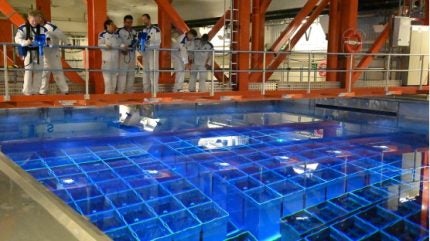
In 2023, the IAEA conducted more than 3,000 in-field verification activities at more than 1,300 nuclear facilities and ‘locations outside facilities’ around the world, according to the Safeguards Statement and Background for 2023. As a result the IAEA was able to draw safeguards conclusions for 189 States with safeguards agreements in force.
“During 2023, our safeguards inspectors spent over 14,000 calendar days at nuclear facilities and ‘locations outside of facilities’ to conduct nuclear verification activities,” said Massimo Aparo, IAEA Deputy Director General and Head of the Department of Safeguards. “This represents the IAEA’s critical mission to verify that the ever-growing amounts of nuclear material around the world remain in peaceful use.”
Of the 189 States where the IAEA implemented safeguards during the year, 181 had a comprehensive safeguards agreement in force, 136 of which also had an additional protocol in force. The additional protocol significantly increases the IAEA’s ability to verify the peaceful use of nuclear material by providing the Agency with access to additional safeguards relevant information, nuclear sites and locations.
Among the 136 States with a comprehensive safeguards agreement and an additional protocol in force, the IAEA was able to conclude that “all nuclear material remained in peaceful activities” for 74 countries. The IAEA drew this conclusion, also known as the ‘broader conclusion’, for the first time for Lesotho. For the other 62 countries, because evaluations regarding the absence of undeclared nuclear material and activities remained ongoing, the IAEA was only able to conclude that declared nuclear material remained in peaceful activities.
For the 45 States with a comprehensive safeguards agreement in force, but no additional protocol in force, the IAEA was also only able to conclude that declared nuclear material remained in peaceful activities.
As of the end of 2023, four States Parties to the Treaty on the Non-Proliferation of Nuclear Weapons (NPT) had yet to bring into force comprehensive safeguards agreements with the Agency. The IAEA could not draw any safeguards conclusions for these countries.
Some countries – India, Israel and Pakistan – have item-specific safeguards rather than comprehensive safeguards in force. In these cases, where the Agency does not have access to all nuclear facilities in the country, the report concluded that “nuclear material, facilities or other items to which safeguards had been applied remained in peaceful activities”.
The Agency also does not have access to all nuclear facilities for the five officially acknowledged nuclear weapons States with voluntary offer agreements in force – China, France, Russia, the UK and the US). For these, IAEA concluded that “nuclear material in selected facilities to which safeguards had been applied remained in peaceful activities or had been withdrawn from safeguards as provided for in the agreements”.
During the year, a new comprehensive safeguards agreement with a small quantities protocol entered into force for Sao Tome and Principe. The protocol is based on the revised standard text for States with minimal or no nuclear material and without any existing or planned facilities. An additional protocol also entered into force for Bolivia and for Sao Tome and Principe.






